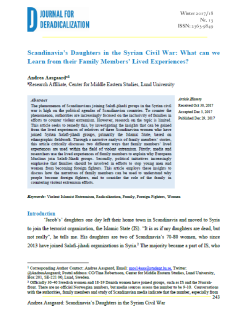This article explores the lives of three Scandinavian families whose daughters went to Syria to join Salafi-jihadi groups. The research is based on ethnographic fieldwork. The research shows how families have key insights about the process of radicalisation and how families can be supportive of effective PCVE by sharing their stories. However their narratives should not be taken at ‘face value’ - for example family members are likely to over emphasize victimhood over agency of those who traveled even when their own narrative reveals the women’s choices - as their narratives are often driven by coping mechanisms to manage their own grief and trauma. Family members feel abandoned by society. The research suggests that families’ highly emotional and affective narratives may assist in PCVE by showing the destruction to family members' lives.
2017
